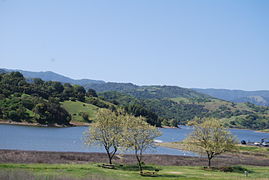Sunday evening, November 16, 2014, 60 Minutes aired a segment on depletion of our water and the possibility of actual worldwide "water wars." If you didn't see this, please take time to view the video or read the script.

As I watched the program outlining the dire predictions and all-too-possible outcome of our flagrant misuse of this natural resource, I thought of a comment by Rachel Carson,
whose groundbreaking book, Silent Spring came out over 50 years ago: "In an age when man has forgotten his origins and is blind even to his most essential needs for survival, water, along with other resources, has become the victim of his indifference."
This article, "Global Climate Change - Vital Signs of the Planet," reminded me of Nick Drake's poem:
The future says,
"Dear mortals;
I know you are busy with your colourful lives;
I have no wish to waste the little time that remains
On arguments and heated debates;
But before I can appear
Please, close your eyes, sit still
And listen carefully
To what I am about to say;
I haven't happened yet, but I will.
I can't pretend it's going to be
Business as usual.
Things are going to change.
I'm going to be unrecognisable.
Please, don't open your eyes, not yet.
I'm not trying to frighten you.
All I ask is that you think of me
Not as a wish or a nightmare, but as a story
You have to tell yourselves -
Not with an ending
In which everyone lives happily ever after,
Or a B-movie apocalypse,
But maybe starting with the line
'To be continued...'
And see what happens next.
Remember this; I am not
Written in stone
But in time -
So please don't shrug and say
What can we do?
It's too late, etc, etc, etc.
Dear mortals,
You are such strange creatures
With your greed and your kindness,
And your hearts like broken toys;
You carry fear with you everywhere
Like a tiny god
In its box of shadows.
You love festivals and music
And good food.
You lie to yourselves
Because you're afraid of the dark.
But the truth is: you are in my hands
And I am in yours.
We are in this together,
Face to face and eye to eye;
We're made for each other.
Now those of you who are still here;
Open your eyes and tell me what you see.”
